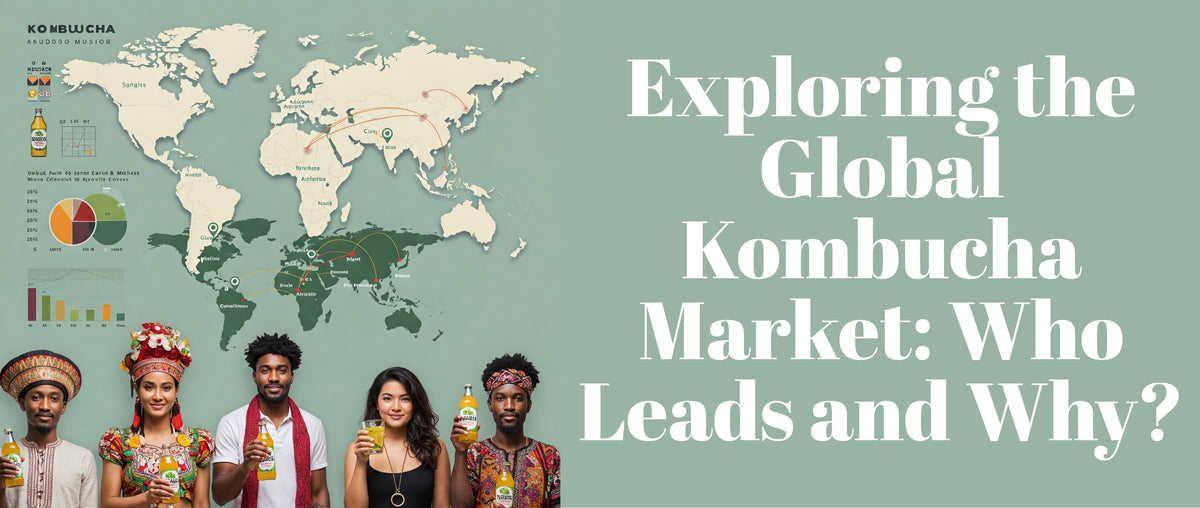Exploring the Global Kombucha Market: Who Leads and Why?
Kombucha, a fermented tea-based beverage, has taken the world by storm, emerging as one of the fastest-growing Healthy Drinks in recent years. Packed with probiotics, antioxidants, and organic acids, this drink has gained immense popularity among health-conscious consumers who prefer plant based foods over processed alternatives. The kombucha market has witnessed exponential growth due to the rising demand for cholesterol free foods and functional beverages that promote gut health.
With major players like GT’s Living Foods, KeVita, and Health-Ade, the industry is becoming increasingly competitive. This article explores the global kombucha market, analyzing key factors, market trends, and future outlook.
Key Takeaways
- The global kombucha market is projected to grow at 15% CAGR over the next five years.
- North America leads, while Europe and Asia-Pacific see rising demand.
- Top brands leverage marketing, innovation, and distribution networks.
- Healthy eating habits are driving functional beverage growth.
- Challenges include regulations, supply chains, and competition.
Understanding Kombucha
What is Kombucha?
Kombucha is a fermented tea made with a SCOBY, sugar, and tea. Its fermentation creates tang, fizz, and gut-friendly compounds.
This probiotic-rich drink dates back over 2,000 years and is especially popular among those on a heart healthy diet.
Health Benefits of Kombucha
| Health Benefit | How It Helps |
|---|---|
| Probiotics | Supports gut health |
| Detoxification | Aids liver detox and removes toxins |
| Boosts Immunity | Rich in antioxidants |
| Aids Digestion | Helps nutrient absorption |
| Energy Boost | Includes B vitamins and organic acids |
Often blended in smoothies with plant based protein options like vegan cheese, cashew butter, and unsalted butter—perfect for a high protein vegan breakfast.
Global Market Overview
The kombucha market continues to thrive due to the surge in healthy drinks and cholesterol free foods.
Market Size and Growth
| Year | Market Size (USD Billion) | Growth Rate |
|---|---|---|
| 2022 | 2.64 | - |
| 2025 | 4.32 | 15% CAGR |
| 2030 | 7.05 | 15% CAGR |
- Health Awareness: Linked to heart healthy diets and plant based foods.
- Rise of Veganism: Boosts demand for vegan butter, vegan cheese, and plant based proteins.
- Flavor Innovations attract younger consumers.
- E-commerce makes it easier to buy kombucha online.
Regional Analysis
North America: Market Leader
- US and Canada = 40% of global kombucha sales.
- Driven by healthy snacks for kids and low fat mayonnaise.
- GT’s Living Foods and KeVita lead the region.
Europe: Rapid Growth
- Fuelled by cholesterol free foods and high protein vegan food.
- Top markets: UK, Germany, France.
- Regulations affect labeling and shelf life.
Asia-Pacific: Rising Interest
- Strong presence in China, Japan, Australia.
- Supportive plant-based trend: Oat Milk, vegan butter.
Kombucha Market: Leading Companies
The kombucha market is dominated by a few key players leveraging product innovation, marketing, and distribution to stay ahead.
GT’s Living Foods: The Pioneer
- Founded in 1995, GT’s is the largest kombucha brand globally.
- Offers raw, unpasteurized kombucha with 30+ flavors.
- Focuses on organic ingredients and sustainability.
- Distributed across North America, Europe, and Asia-Pacific.
KeVita: PepsiCo-Owned Powerhouse
- Acquired by PepsiCo in 2016.
- Focuses on probiotic-rich kombucha and sparkling drinks.
- Targets high protein vegan breakfast fans with functional beverages.
Health-Ade: The Challenger
- Known for organic, cold-pressed kombucha.
- Popular among younger consumers seeking healthy eating choices.
- Expanding to low sugar and caffeine-free options.
Comparison Table
| Company | Founded | Strengths | Reach |
|---|---|---|---|
| GT’s Living Foods | 1995 | Raw, organic, 30+ flavors | Global |
| KeVita (PepsiCo) | 2009 | Large network, probiotics | NA, Europe |
| Health-Ade | 2012 | Trendy, small-batch, clean | NA |
Key Factors for Market Leadership
Product Innovation
- Flavor expansion: ginger turmeric, lavender mint, passionfruit.
- Functional combos with plant based protein, collagen, adaptogens (vegan bodybuilding diet).
- Low sugar/alcohol-free variants for heart healthy diet followers.
Marketing Strategy
- Strong social media presence and influencer partnerships.
- Healthy Drinks endorsements by celebrities.
- Brand presence at plant based foods events and expos.
Distribution Channels
- Retail chains (Whole Foods, Trader Joe’s).
- DTC e-commerce subscriptions.
- Collabs with cafes offering vegan cheese platters and cashew butter toast.
Consumer Trends Shaping Growth
1. Health & Wellness
- Rising demand for Healthy Drinks over soda.
- High Protein Vegan Food pairs well with kombucha.
- Common in high protein vegan breakfast blends.
2. Sustainability
- Glass packaging, recyclable materials.
- Ethical sourcing of tea & sweeteners.
- Carbon-neutral initiatives.
3. Flavor Innovation
- Classic: lemon, berry, ginger.
- Exotic: matcha, hibiscus, dragonfruit.
- Herb-infused: basil, rosemary.
Trend Impact Table
| Trend | Market Effect |
|---|---|
| Health Consciousness | Push for low-sugar, gut-boosting kombucha |
| Sustainability | Favor brands using eco-packaging |
| Flavor Diversity | Demand for rotating seasonal & exotic flavors |
Challenges in the Market
- Regulations: Alcohol levels must stay below 0.5% or be labeled as alcoholic.
- Labeling: Health claims must meet legal standards.
- Supply Chain: Organic sourcing and cold storage logistics can limit growth.
Regulatory Issues
The kombucha industry operates in a complex regulatory landscape due to its fermentation process and alcohol content.
- Alcohol Content Concerns: Traditional kombucha can develop alcohol levels above 0.5%, requiring strict compliance.
- Labeling Standards: Brands must clearly disclose ingredients and health claims.
- Regional Restrictions: Some countries restrict unpasteurized kombucha.
Competition from Other Beverages
- Probiotic Waters & Functional Sodas: Poppi and OLIPOP are gaining attention.
- Oat Milk & Dairy-Free Drinks: Some healthy drink fans prefer Oat Milk.
- Fermented Alternatives: Options like kefir and kvass are rising in popularity.
Supply Chain and Production Challenges
- Quality Control: Scaling fermentation while maintaining quality is tough.
- Sourcing Organic Ingredients: Supply for tea, sweeteners, and probiotics is limited.
- Distribution Costs: Kombucha's shelf life and refrigeration needs raise costs.
| Challenge | Impact | Solution |
|---|---|---|
| Regulatory Issues | Restricted markets | Clear labeling, alcohol-free variants |
| Rising Competition | Loss of market share | Unique flavors & branding |
| Supply Chain | Increased costs | Local sourcing & tech upgrades |
Future Outlook
- Projected Market: $7+ billion by 2030
- Growth Region: Asia-Pacific via rising plant based food trends
- Diet Focus: Boosted by heart healthy diet preferences
Innovations on the Horizon
- High Protein Kombucha: Formulated with plant based protein
- Infused Functional Blends: Ashwagandha, turmeric, lion’s mane
- Kombucha Snacks: Ideas like kombucha-glazed nuts & kombucha-infused cheddar cheese
Strategic Advice for New Entrants
- Position kombucha alongside vegan butter, unsalted butter, and cashew butter.
- Collaborate with Healthy Snacks for Kids and cholesterol free food brands.
- Use social media and influencers to share kombucha benefits.
| Trend | Expected Impact |
|---|---|
| Low-Sugar Kombucha | Appeals to health-minded shoppers |
| Infused Kombucha | Broadens product lineup with adaptogens |
| E-Commerce Growth | Increases reach and repeat purchases |
Conclusion
The kombucha market continues to grow, fueled by demand for healthy eating, cholesterol free foods, and plant based foods.
Brands like GT’s Living Foods, KeVita, and Health-Ade are thriving through innovation and marketing. But to remain competitive, companies must address regulatory limits, diversify products, and embrace low-sugar and functional blends like plant based protein.
For new entrants, success lies in targeting health-conscious buyers, utilizing digital platforms, and offering clean-label, purposeful beverages. The future of kombucha is bright—especially within a balanced healthy diet.
Do you enjoy vegan food? We have a list of vegan restaurants in India to help you find delicious options in your area!












